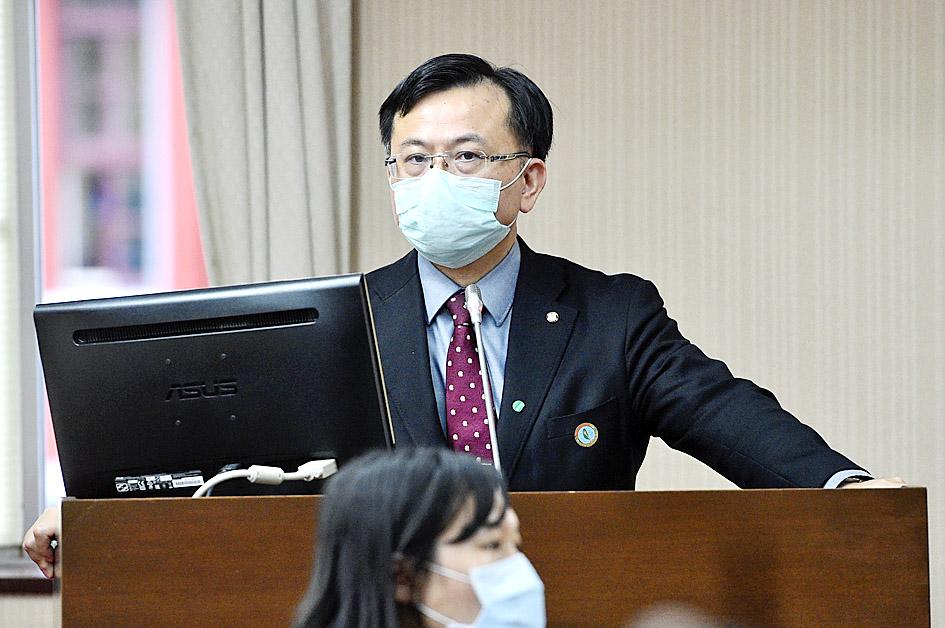Acting National Communications Commission (NCC) Chairman Chen Yaw-shyang (陳耀祥) yesterday denied that he was scolded by Premier Su Tseng-chang (蘇貞昌) for mismanaging a case involving Taiwan Optical Platform, adding that the commission is an independent agency that is ruled by consensus.
At a meeting of the Legislative Yuan’s Transportation Committee, lawmakers asked Chen about files sent to the media in a suspected cyberattack on the Presidential Office. The office has said that the files were doctored.
Among the files, one said that Vice Premier Chen Chi-mai (陳其邁) had allegedly proposed that President Tsai Ing-wen (蔡英文) take back the right to make policy decisions, adding that she should not let Su have the final say in an NCC personnel matter.

Photo: George Tsorng, Taipei Times
The files alleged that Su scolded Chen Yaw-shyang for mishandling a case involving Taiwan Optical Platform’s plan to establish a TV news station, and that Su only kept him in charge of the NCC because Chen Yaw-shyang would obey him.
The document also said that two nominees for NCC commissioners have in the past generally aligned themselves with the pan-green camp’s agenda, and they could help the commission handle issues with CtiTV News, which is widely seen as in favor of the pan-blue camp.
Asked by Chinese Nationalist Party (KMT) Legislator Hung Meng-kai (洪孟楷) whether he was verbally reprimanded by Su and was considered “an observing government official,” Chen Yaw-shyang said he was surprised to see this information in the news, and that the document contained fabricated information.
Chen Yaw-shyang also denied that he was instructed to handle any specific news media.
“The NCC is an independent agency, and commissioners rule on cases by themselves,” he said.
Asked if he was asked to take the reins of the proposed digital ministry, Chen said that the decision to establish a new government agency would have to be made by the Executive Yuan.
Democratic Progressive Party (DPP) Legislator Ho Shin-chun (何欣純) said that, as one of the stakeholders in the incident, Chen Yaw-shyang should defend the commission and himself if the information is not true.
While KMT lawmakers tried to batter the commission with the leaked information, DPP legislators also questioned the commission’s handling of Chinese over-the-top (OTT) content providers iQiyi (愛奇藝) and WeTV, after it was determined at an interdepartmental meeting on Friday last week that they had breached the Act Governing Relations Between the People of the Taiwan Area and the Mainland Area (臺灣地區與大陸地區人民關係條例) by illegally releasing advertisements in Taiwan to attract subscribers.
Ho and DPP Legislator Lin Chun-hsien (林俊憲) said that the commission had given people the impression that it could only handle matters related to OTT providers by stipulating a specific law to regulate them.
Chen Yaw-shyang said that iQiyi and WeTV are from China, so the act applies to them.
The commission’s proposed law would regulate all other OTT operators, at home and overseas, he said.

POSITIVE DEVELOPMENT: Japan and the US are expected to hold in-depth discussions on Taiwan-related issues during the meeting next month, Japanese sources said The holding of a Japan-US leaders’ meeting ahead of US President Donald Trump’s visit to China is positive news for Taiwan, former Japan-Taiwan Exchange Association representative Hiroyasu Izumi said yesterday. After the Liberal Democratic Party’s landslide victory in Japan’s House of Representatives election, Japanese Prime Minister Sanae Takaichi is scheduled to visit the US next month, where she is to meet with Trump ahead of the US president’s planned visit to China from March 31 to April 2 for a meeting with Chinese President Xi Jinping (習近平). Japan and the US are expected to hold in-depth discussions on Taiwan-related issues during the

‘LIKE-MINDED PARTNER’: Tako van Popta said it would be inappropriate to delay signing the deal with Taiwan because of China, adding he would promote the issue Canadian senators have stressed Taiwan’s importance for international trade and expressed enthusiasm for ensuring the Taiwan-Canada trade cooperation framework agreement is implemented this year. Representative to Canada Harry Tseng (曾厚仁) in an interview with the Central News Agency (CNA) said he was increasingly uneasy about Ottawa’s delays in signing the agreement, especially as Ottawa has warmed toward Beijing. There are “no negotiations left. Not only [is it] initialed, we have three versions of the text ready: English, French and Mandarin,” Tseng said. “That tells you how close we are to the final signature.” Tseng said that he hoped Canadian Prime Minister Mark Carney

President William Lai (賴清德) yesterday bestowed one of Taiwan’s highest honors on Saint Vincent and the Grenadines (SVG) Ambassador Andrea Clare Bowman in recognition of her contributions to bilateral ties. “By conferring the Order of Brilliant Star with Grand Cordon on Ambassador Bowman today, I want to sincerely thank her, on behalf of the Taiwanese people, for her outstanding contribution to deepening diplomatic ties between Taiwan and SVG,” Lai said at a ceremony held at the Presidential Office in Taipei. He noted that Bowman became SVG’s first ambassador to Taiwan in 2019 and

A man walks past elementary school artworks at the Taipei Lantern Festival in Ximen District yesterday, the first day of the event. The festival is to run from 5pm to 10pm through March 15.